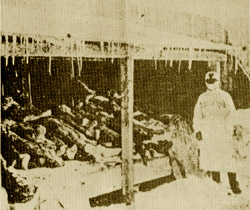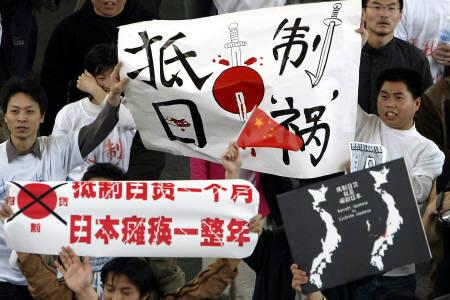
CENTURY OF THE DRAGON

April of 2005 was a month of widespread demonstration in China. Even in regions where people rarely show up for public demonstrations;
such as remote rural regions, small towns, and even in southern China, which has been traditionally apolitical by communist standards.
They carried banners in there own small towns and choked the streets of their giant metropolises to protest what they consider a travesty of historical justice. The processions ended at the doorsteps of Japanese Embassies and business interests. The signs they carried ran from the benign, like "Face Up to History", to the vitriolic "Japan Invaders Must Die!"


What that demonstrates for us is how truly long-thinking the Chinese people are. For them the revolution of '49 is not a thing of the past but unfinished business, just as on the Korean Penninsula the war of '50 to '53 merely sleeps...waiting to erupt again.
Americans are poor students of history, and our affluence may have bred an apathy we can ill afford. Historical revisionists spoon-feed our nations youth as I write this, with a watered down version of history that systematically dishonors our heritage and even our living veterans. But the bill- of-rights affords us with an outlet to maintain a ballance between extremes.
The internet, the flood of history books printed in the U.S., and even some of what comes out of Hollywood can add to the debate. The dangers in a free society arise when no debate exists.
That is why when children are taught in public school history classes that slavery was some sort of uniquely American institution, I can point out here the glossed over fact that the American slavery was the extension of a well established European institution, exported from a well established African institution, that still exists today on that Continent. And that we were the only nation on earth to purge itself of such great sin with the blood of 650,000 of its own sons. And, that it endured in countries like Brazil long after we had done away with it.
So where do we stand now with China? Where do we fall on their radar screen of history? All-in-all its hard to say: 1. We helped liberate them from Japan. 2. We guaranteed the security of their enemies in Taiwan. 3. We fought them in pitched battles during the Korean War. 4. We rebuilt Japan into a world dominating economy. 5. We fought their sponsored communist allies in Vietnam. 6. We defeated their European counterparts in Russia and Eastern Europe. 7. We gave them Most Favored Nation status in trade. An odd mix, to be sure.
Given these few facts, what is China's place in the world today? And what does it mean for the security of the west? The dismal track record of the United Nations gives one little hope for international resolve in the face of Chinese aggression. In the final analysis, it will still be up to the United States to occupy the front-line of the second cold war to come.
Though described from inception as an unconditional surrender, Japan's surrender to the west was anything but. Though the commandants of some of the most notorious Japanese death-camps, and other high-profile war criminals were tried and sometimes hanged, the Emperor by agreement was never culpable for the actions of his military.
Comparatively, the sweeping manhunts of Nuremburg didn't take place in Japan. The Japanese were not expected to take the responsibility for the actions of their government that in some ways Germans were expected to. And, luckily for them, they never suffered under Soviet occupation. Mostly thanks to General Douglas MacArthur, their military governor under occupation.
Lincoln admonished us all that a nation that doesn't honor its war dead will not endure the test of history. Nations do, and should, raise monuments to the soldiers who fought for the freedoms of their countrymen, or even more so, for the freedoms of other oppressed peoples. But in Tokyo you can find a monument raised to the Japanese Army Unti 731.
Unit 731 was a camp in occupied China built to develope biological weapons. At least 9,000 human subjects would die during the developement phase alone, as the Japanese Army subjected them to horrific experimentation.
Before the end of the war, the Japanese would dis-seminate bubonic plague, cholera, anthrax, and other germs grown in Unit 731, throughout the Chinese countryside. Tens of thousands were to die.
You could look around Germany all you wanted, but you would be hard pressed to find a monument to the "heroes" of Dachau.
Well the Chinese have also vowed to "never forget" it seems. And so for the honor of their millions who died or suffered as slaves and sexual servants for the occupying Japanese, they seek justice in the pages of history.
So why now? It seems that the latest round of Japanese history books have sought to rewrite history once again. The Japanese have chosen to teach their children that they didn't enslave 200,000 Korean women as sexual slaves for their armies. Or